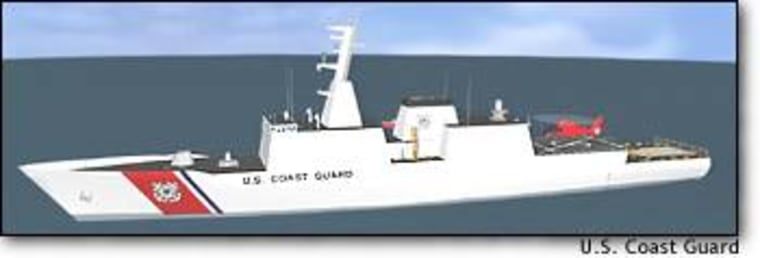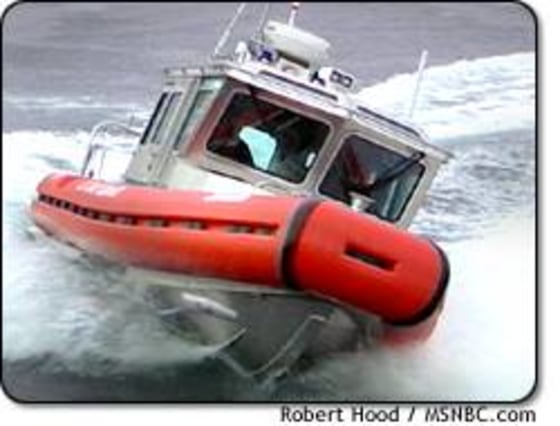The U.S. Coast Guard is embarking on a transformation of leviathan proportions, moving to reshape itself as a modern military force capable of defending the country’s shores from terrorists. Even those who wonder if the agency’s new emphasis on homeland security will affect its performance of safety and regulatory duties acknowledge that the makeover is long overdue.
The Sept. 11, 2001, terrorist attacks propelled the Coast Guard to the forefront of border security and eventually led to the decision to shift the service from the federal Transportation Department to the new Homeland Security Department. With 41,000 employees, the Coast Guard will be the second-largest component of the new department when the switch is completed next year.
Some skeptics have questioned whether an agency that has long been primarily focused on regulatory and safety issues is up to the task of protecting 95,000 miles of coastline — more than 12 times the 7,514 miles of terra firma guarded by the U.S. Border Patrol — as well as 361 major ports.
But Coast Guard officials say the “multi-mission agency” has a long tradition of service on military and security missions, including duty in Vietnam and the Persian Gulf.
'Not a new mission'
“This mission is not a new mission,” said Vice Adm. Terry Cross, commander of the Pacific area and former chief of Coast Guard operations. “During World War II, we actually had more people engaged in port security than we’ve got in the entire Coast Guard today.”
The Coast Guard also has a unique role under U.S. law that makes it well-suited for port and coastal security duties. It’s considered part of the Defense Department only during times of war and hence is not constrained by the Posse Comitatus Act of 1878, which prohibits the military from engaging in domestic police functions.
Happily for Coast Guard officials, recognition of the agency’s importance in homeland security has brought a willingness to bankroll the costly upgrade of its outmoded fleet and air wing, as well as an increase in manpower. The Bush administration has proposed increasing the Coast Guard’s operating budget to $4.6 billion this year from $3.7 billion last year, and Congress is expected to at least meet that target.
Some of that money will be used to boost manpower: About 2,200 new recruits are expected to come on board during fiscal 2003 — a 6 percent increase over the current 36,000 active-duty personnel. More recruits are expected over the next several years.
The Deepwater Program
The centerpiece of the Coast Guard makeover, however, is the Deepwater Program, the largest acquisition program in the agency’s history. The contract awarded in June, potentially worth $11 billion, envisions spending at least $500 million annually for 20 years or more to replace the 91 cutters and 206 aircraft that the Coast Guard uses for open-seas operations, as well as command-and-control systems. A separate maintenance and operations provision pushes the overall value of the contract to nearly $17 billion.
The replacement of the equipment is, in many cases, long overdue, Cross said.
“We have two cutters in Alaska that are 60 years old,” he said. “That’s a lot of time to run a ship, especially in a saltwater environment. Earlier this year both had serious mechanical problems and we had to cancel patrols until they could be repaired.”

The biggest benefits of the program won’t be seen immediately. The first new vessel under the program — the 421-foot National Security Cutter — is due for delivery in 2006.
Also in the Deepwater contract with Integrated Coast Guard Systems — a venture of Lockheed Martin Corp. and Northrop Grumman Corp. — is the acquisition of nearly 80 unmanned aircraft, or drones, for use in surveillance operations. The first of two classes of drones also are due to be delivered in 2006.
The service also awarded a $611 million contract to General Dynamics Corp. in September to replace its 30-year-old emergency radio network — the VHS-FM National Distress and Response System — with a new Rescue 21 communications network that will improve the ability to detect and locate distress calls and eliminate radio gaps.
Anti-terror teams deployed
Even before those projects reach cruising speed, the Coast Guard has bolstered its capabilities for port and coastal security missions with the deployment of anti-terrorism Maritime Safety and Security Teams and the acquisition of a new line of small boats armed with M-60 machine guns.
The MSST squads, which range in size from 70 to 100 members, have been deployed in Seattle, San Pedro in Southern California, Hampton Roads, Va., and in Houston/Galveston, said Cross. Eventually the service hopes to place up to a dozen teams, whose members are trained to deal with biological, chemical and radioactive threats, at high-risk harbors and ports, he said.
The teams do much of their patrol work in 25-foot Defenders, an agile boat powered by twin Honda 225hp outboards and capable of topping 40 knots, nearly 50 mph. The boats, which are armed with M-60 machine guns when on patrol, are “virtually unsinkable,” said Master Chief Curtis Mauck, boat forces manager for the Coast Guard’s 13th District in the Pacific Northwest.
One hundred of the Defenders, built by Safe Boats International of Port Orchard, Wash., were purchased under a non-competitive $17.5 million contract, allowable because of the immediate need for a fast, maneuverable boat capable of performing in-close security duties.
The Coast Guard is weighing bids from three companies — Safe Boats International, Zodiac of North America of Stevensville, Md., and SeaArk Marine of Monticello, Ark. — for a permanent contingent of 700 small boats, a contract worth an estimated $145 million over seven years.
Other boats due for replacement
It also is nearing a deal to replace its 85-foot patrol boats, a program for which no cost estimate has been made public, and has requested proposals for replacement of its 41-foot utility boats.
Congress has been generally supportive of the spending spree, a recognition that the Coast Guard hasn’t been given adequate funding in years past to modernize its fleet and air force.
The General Accounting Office did raise questions about the Deepwater Project in a May 2001 report, questioning the long-term budgetary assumptions in light of the service’s historic funding levels, but those concerns appear to have evaporated in the wake of the Sept. 11 attacks.
Also diminished are fears that the Coast Guard’s move to the Homeland Security Department would lead to neglect of the service’s other roles, such as fishery protection and search and rescue. Sens. Ted Stevens, R-Alaska, and Susan Collins, R-Maine, helped quell such concerns by inserting language into legislation creating the Homeland Security Department that bars the Coast Guard from cutting back on such activities.
In fact, some former opponents of the move now say they see benefits spilling over from the Coast Guard’s new clout as a homeland protector.
Former foe won over
“Going into Homeland Security, they’re going to get money like they never got before,” said Michael Sciulla, a lobbyist for Boat/U.S., an early opponent of plans to move the Coast Guard’s safety and regulatory functions out of the Transportation Department.
“There is a chance for something good to come out of this for the boating public because that money is going to lead to more ships, more planes and an advanced communications system that will literally take the search out of search and rescue,” he said, referring to the capability of the Rescue 21 system to pinpoint the location of a distress call.
A few remaining critics — notably other recreational boating groups and fishing associations — still have reservations about the Coast Guard’s ability to keep up with its non-security duties, particularly in the years until its long-term acquisition programs begin to bear fruit.
“Nobody’s against security, but while the Coast Guard has always had a maritime security mission, it has never been their primary responsibility,” said Jeff Pike, a lobbyist with the Commercial Fishing Association.
Cross, the Coast Guard vice admiral in charge of the Pacific area, acknowledged that there has been a slight fall-off in some areas since the Sept. 11 terrorist attacks.
“We’re probably at 5 or 6 percent less (sorties) for fisheries enforcement, counterdrug operations and illegal migrant interdiction,” he said.
But he insisted that the changes on tap for the agency ultimately will have a positive impact across the board.
'Performance will be enhanced'
“We’re going to have a bigger Coast Guard, with more boats on the water and more people,” he said. “Performance of our other duties will be enhanced.”
Cross also noted that despite the departure of many of the Coast Guard reservists called up to active duty after Sept. 11, the service has been able to free some resources that had been devoted to security by “working smart.” Among other things, he said, the service had benefited from the efforts of Coast Guard Auxiliary volunteers assisting with routine tasks and acting “as our eyes and ears out on the water.”
In the Seattle area, “working smart” has meant reaching agreements with other agencies, such as a cooperative shipping container inspection program with the U.S. Customs Service, and working closely with local authorities to close gaps in coverage, said Lt. Scott Casad of the Marine Safety Office for the Puget Sound.
Asked if the service was still straining to cover the port and shipping channels within its purview, Casad replied, “I don’t think strain is the right word. People working hard to keep us safe and secure, yes.”
A war with Iraq could further complicate matters, since the Coast Guard would likely be required to dispatch port and coastal security teams to the Persian Gulf.
But Cross said that would have little impact on homeland security. “Port security units are manned almost entirely by reservists, so if they were needed that would require some sort of expanded call-up,” he said.
Despite such assurances, some knowledgeable observers say that Coast Guard brass will have their hands full trying to satisfy multiple constituencies.
“It’s certainly going to be a challenge and a balancing act through the entire process,” said Doug Dillon, a retired Coast Guard lieutenant who now heads the nonprofit Tri-State Maritime Safety Association in Newport, Del.
